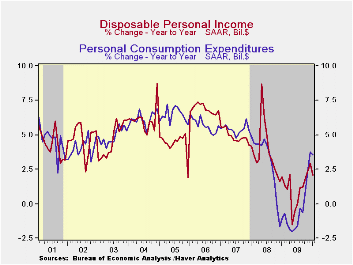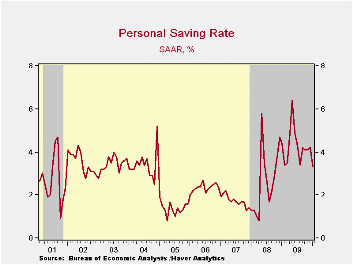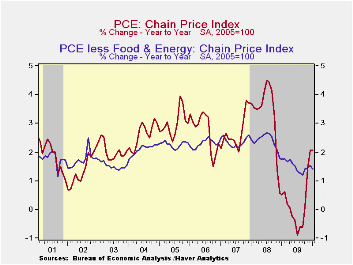 Global| Mar 01 2010
Global| Mar 01 2010U.S. Personal Income Remains Weak
by:Tom Moeller
|in:Economy in Brief
Summary
Overall personal income ticked up just 0.1% in January following downwardly revised increases during the prior two months. The latest weak increase disappointed Consensus expectations for a 0.4% rise. Declines spread through much of [...]
 Overall personal
income ticked up just 0.1% in January following downwardly
revised increases during the prior two months. The latest weak increase
disappointed Consensus expectations for a 0.4% rise.
Overall personal
income ticked up just 0.1% in January following downwardly
revised increases during the prior two months. The latest weak increase
disappointed Consensus expectations for a 0.4% rise.
Declines spread through much of the income spectrum. The weak housing market pulled proprietors' income down 0.3% (+1.6% y/y) and rental income fell 0.3%, the first decline since 2007. Lower interest rates caused interest income also to fall 0.3% though the y/y change of -2.7% was improved from the worst of last September (-8.2% y/y). Dividend income fell 3.0% (-13.3% y/y) though that y/y change was half its worst. Finally, the improved job market and the expiration of long-term benefits caused a 2.2% decline in unemployment insurance payments, the fourth consecutive monthly decline (+36.6% y/y).
To the upside, wages & salaries improved 0.4% after an unrevised 0.1% December increase. Year-to-year growth was still a negative 1.0% but improved from -4.9% during last summer. Wages in the factory sector rose 0.8% but still remained 5.8% lower than last year. In the private service sector wages rose 0.3% following a downwardly revised 0.1% December reading. Government sector wages did increase 0.5% but weak hiring cut the y/y increase to 2.4%, its lowest since early 1994.
Disposable income fell 0.4% and reversed the prior month's increase as tax payments jumped 5.5%. The income decline caused the savings rate to decline to 3.3%, its lowest since late-2008. The rate still was up, however, from the 1.0% low at the beginning of the last recession.
Personal spending rose 0.5% last month following little-revised increases of 0.3%-to-0.5% during the prior three periods. A 7.0% m/m rise in spending on gasoline (41.5% y/y) led the increase as prices spiked, but the real gain was just 2.1% (0.8% y/y). Nominal apparel spending gained 0.6% (1.6% y/y) while outlays on services rose a weakened 0.2% (2.1% y/y). To the downside, spending on motor vehicles & parts fell 1.2% (+5.6% y/y) and spending on home furnishings fell for the third month in the last four (-0.4% y/y).
The PCE chain price index ticked up just 0.2% during January and 2.1% y/y with higher gasoline prices. The core PCE price deflator was unchanged during January and that reflected weakness throughout the categories.
The personal income & consumption figures are available in Haver's USECON and USNA databases.


| Disposition of Personal Income (%) | January | December | November | Y/Y | 2009 | 2008 | 2007 |
|---|---|---|---|---|---|---|---|
| Personal Income | 0.1 | 0.3 | 0.4 | 1.1 | -1.7 | 2.9 | 5.6 |
| Disposable Personal Income | -0.4 | 0.4 | 0.5 | 2.1 | 1.1 | 3.9 | 4.9 |
| Personal Consumption Expenditures | 0.5 | 0.3 | 0.5 | 3.5 | -0.4 | 3.1 | 5.4 |
| Saving Rate | 3.3 | 4.2 | 4.1 | 4.4 (Jan.'09) | 4.3 | 2.6 | 1.7 |
| PCE Chain Price Index | 0.2 | 0.1 | 0.2 | 2.1 | 0.2 | 3.3 | 2.7 |
| Less food & energy | 0.0 | 0.1 | 0.1 | 1.4 | 1.5 | 2.4 | 2.4 |
Tom Moeller
AuthorMore in Author Profile »Prior to joining Haver Analytics in 2000, Mr. Moeller worked as the Economist at Chancellor Capital Management from 1985 to 1999. There, he developed comprehensive economic forecasts and interpreted economic data for equity and fixed income portfolio managers. Also at Chancellor, Mr. Moeller worked as an equity analyst and was responsible for researching and rating companies in the economically sensitive automobile and housing industries for investment in Chancellor’s equity portfolio. Prior to joining Chancellor, Mr. Moeller was an Economist at Citibank from 1979 to 1984. He also analyzed pricing behavior in the metals industry for the Council on Wage and Price Stability in Washington, D.C. In 1999, Mr. Moeller received the award for most accurate forecast from the Forecasters' Club of New York. From 1990 to 1992 he was President of the New York Association for Business Economists. Mr. Moeller earned an M.B.A. in Finance from Fordham University, where he graduated in 1987. He holds a Bachelor of Arts in Economics from George Washington University.
More Economy in Brief
 Global| Feb 05 2026
Global| Feb 05 2026Charts of the Week: Balanced Policy, Resilient Data and AI Narratives
by:Andrew Cates






